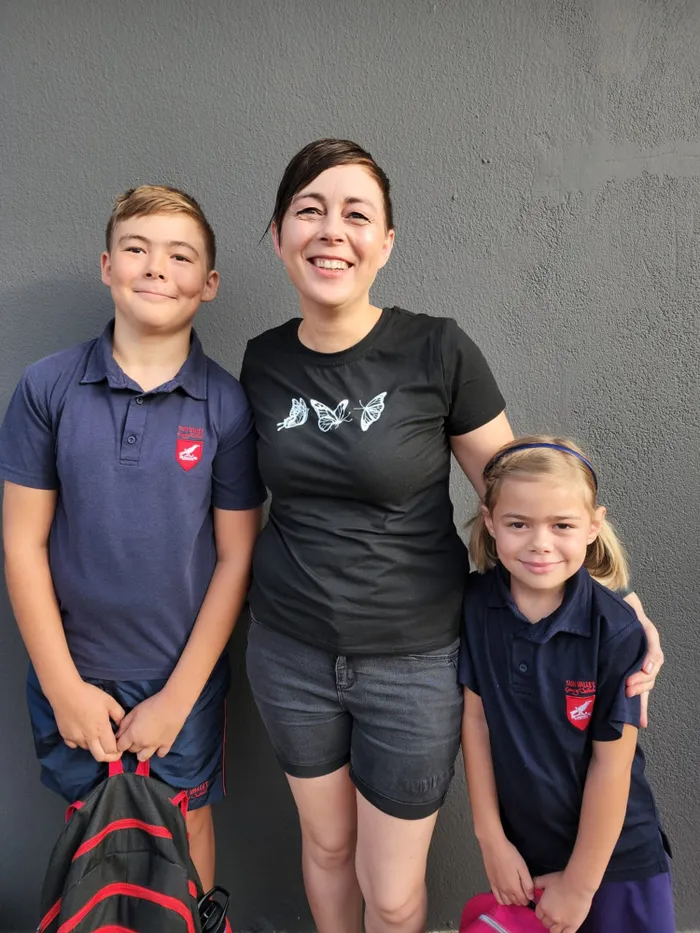Cystic fibrosis sufferers fight for ‘life-saving’ drug

Jolene du Plessis with her two children, Lucah, 11, and Rynah, 6.
A Sunnydale mother whose daughter has cystic fibrosis has joined a global campaign to challenge the high cost of a drug that can save her daughter’s life.
Jolene du Plessis and other parents of children with cystic fibrosis have started a petition and have filmed a video in response to an advertisement from Vertex Pharmaceuticals, the manufacturer of Trikafta, a “life-saving” drug.
The video, filmed on the Noordhoek Common with the help of VertexSaveUs, a UK-based patient advocacy group, features her 6-year-old daughter, Rynah, on a swing.
The Vertex Pharmaceuticals advert, which Ms Du Plessis calls “insensitive”, was released in November last year and can be seen on Instagram.
It says damage to the lungs and other organs caused by cystic fibrosis is inevitable and that those with the illness should not wait for their condition to worsen before seeking treatment. The final tagline is, “Don’t wait for cystic fibrosis.”
But the advert did not show the exorbitant cost of Trikafta, said Ms Du Plessis
Rynah, who was diagnosed with cystic fibrosis just before her second birthday, is now eligible to use Trikafta after a lobectomy of the right upper lobe in her lung at the age of 3, but it's impossible for the family to afford it because it costs $326 000 (about R5.8 million) a year per patient.
“It gives people false hope as only about 12% of eligible cystic fibrosis patients around the world actually have access to these drugs,” Ms Du Plessis said of the advert.
“Trikafta could mean the difference between life and death for my daughter and for other cystic fibrosis sufferers worldwide.”
Cystic fibrosis is a genetic disease that causes a build-up of thick, sticky mucus in the body, especially the lungs, because the body can’t produce a protein, cystic fibrosis transmembrane conductance (CFTR), according to Dr Marco Zampoli, a paediatric pulmonologist at Red Cross War Memorial Children’s Hospital and associate professor at the UCT.
Dr Zampoli described Trikafta as a "miracle drug“ as it helped the body produce a better quality CFTR protein, which reversed the effects in the body, especially if started early in life.
“Instead of dying at a young age, people with cystic fibrosis can look forward to a much healthier and normal life, especially if started in children.”
Kimberly Keyzer, chairwoman of the South African Cystic Fibrosis Association, said no other drug company manufactured CFTR medications, giving Vertex a monopoly - secured through patents and other intellectual property protection - that stopped other firms from producing cheaper drugs or generics.
The VertexSaveUs video, also available on on Instagram, uses a similar setting and background music to the Vertex ad but says that without access to the company’s cystic fibrosis drug, Trikafta, the damage is already taking place inside your body before you see the symptoms progress.
The video then ends with the tagline, “Vertex pharmaceuticals, don’t make us wait to see cystic fibrosis.”
Ms Keyzer said that in 2020, the association formed the Cystic Fibrosis New Frontiers Committee (CFNFC) to fight for cheaper access to Trikafta for the cystic fibrosis community in South Africa.
The CFNFC had started talks with Vertex in mid-2020 and, together with campaigners from other countries, had met with Vertex representatives, but communications had stopped after December 2021, she said.
As of last week, Ms Keyzer said, the association had joined a CFNFC member, as the second applicant in her application to the Johannesburg High Court to petition for a special compulsory licence to allow other manufacturers to import generic versions of Trikafta.
Vertex Pharmaceuticals spokesman Daria Munsel said it was the company’s “overall aim” to make its cystic fibrosis medicines available to as many patients as possible around the world, regardless of where they lived or what resources they had.
Vertex had recently signed a contract with a South African distributor, which was a key step in making Trikafta available to “eligible” cystic fibrosis patients in South Africa, she said.
However, making innovative medicines accessible to patients in South Africa was "highly complex“, and it could take up to four and a half years to get marketing authorisation, pricing approval and an agreement on reimbursement and access, she said.
Ms Du Plessis said she could not understand why Vertex would not allow compassionate access to those who are dying in South Africa.
She said only 40 countries had access to Trikafta since it had been approved by the Food and Drug Administration (FDA) three years ago.
“Three years is a long time when fighting deteriorating health. Lives have been lost, and people have had to have lung transplants that could have been avoided with Trikafta,” she said.
The petition had 36 954 signatures at the time of going to print.

